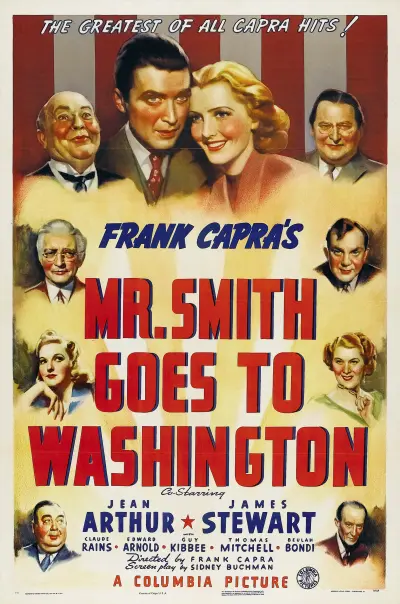
"Mr. Smith Goes to Washington," directed by the esteemed Frank Capra in 1939, stands as an enduring masterpiece in American cinema, weaving a narrative that deeply explores the nuances of political idealism and corruption. The film, starring James Stewart as Jefferson Smith, captures the journey of an idealistic and somewhat naive youth leader who unexpectedly ascends to the U.S. Senate. Initially perceived as a malleable figure by the political elite, Smith's appointment sets in motion a series of events that challenge the status quo of political machinations.
Upon his arrival in Washington, D.C., Smith is mentored by Senator Joseph Paine, who maintains a public image of integrity but is covertly mired in corruption, aligning with a political boss named Taylor. This mentorship marks the beginning of a critical conflict within the film: the clash between Smith's unblemished idealism and the deep-rooted corruption he uncovers in the political arena.
One of the film's central themes is the valorization of "lost causes," a principle dearly held by Smith's father and fervently adopted by Smith. He champions the belief that "lost causes are the only causes worth fighting for," a philosophy that not only propels the film's narrative but also underscores its emphasis on moral fortitude and integrity. This theme becomes the cornerstone of Smith's crusade against the systemic corruption he faces in Washington.
Confronted with the pervasive corruption, Smith verges on leaving his position, disillusioned. However, he is persuaded by his secretary, portrayed by Jean Arthur, to take a stand. This pivotal moment culminates in one of cinema's most iconic sequences: a relentless filibuster where Smith vehemently opposes the corrupt system. This act of rebellion epitomizes the film's message about the significance of standing firm in one's convictions and highlights the impact of individual defiance against seemingly insurmountable odds.
Adapted from Lewis R. Foster's unpublished story "The Gentleman from Montana," the film seamlessly blends elements of drama and comedy to effectively convey its themes. It serves as a poignant critique of political corruption and an uplifting depiction of how steadfast integrity can confront and potentially dismantle a corrupt system.
Today, "Mr. Smith Goes to Washington" remains a compelling and relevant commentary on the dynamics of politics and ethics. Its portrayal of an individual's solitary stand against a corrupt establishment continues to resonate, reminding contemporary audiences of the timeless importance of upholding integrity and the profound influence of championing what is right, regardless of the challenges faced.

